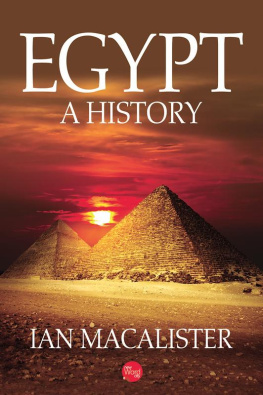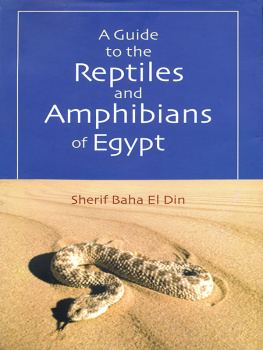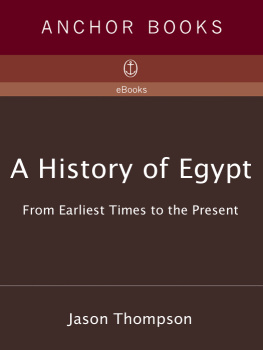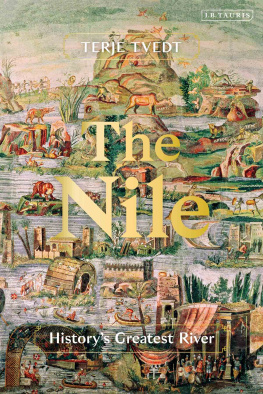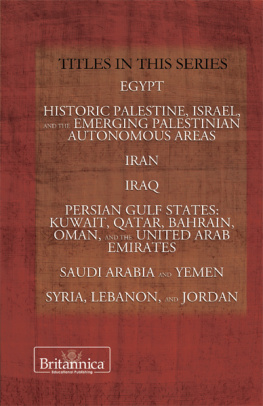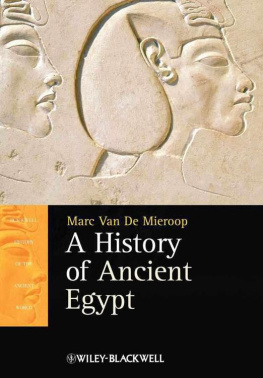EGYPT

Map 1. Map of Egypt

A SHORT HISTORY
With a new afterword by the author
ROBERT L. TIGNOR

Copyright 2010 by Princeton University Press
Published by Princeton University Press,
41 William Street, Princeton, New Jersey 08540
In the United Kingdom: Princeton University Press,
6 Oxford Street, Woodstock, Oxfordshire OX20 1TW
press.princeton.edu
All Rights Reserved
Second printing, and first paperback printing, 2011
Paperback ISBN 978-0-691-15307-0
The Library of Congress has cataloged the cloth edition of this book as follows
Tignor, Robert L.
Egypt : a short history / Robert L. Tignor.
p. cm.
Includes bibliographical references and index.
ISBN 978-0-691-14763-5 (alk. paper)
1. EgyptHistory. I. Title.
DT77.T54 010
962dc22 2010017939
British Library Cataloging-in-Publication Data is available
This book has been composed in ITC Mendoza & Penumbra HalfSerif
Printed on acid-free paper.
Printed in the United States of America
10 9 8 7 6 5 4 3 2
CONTENTS
ILLUSTRATIONS
COLOR PLATES
Following
MAPS
FIGURES
CREDITS
I would like to thank the following individuals and institutions for permission to reproduce photographic materials in their possession: Laura Cobb (, Egypt, administrative divisions. Scale: ca. [1:8,100,00]. Lambert conformai conic projection. [Washington, D.C. : Central Intelligence Agency]. 1997. Publishers no.: Base 802526 (R00622) 597.
PREFACE
I have been involved with Egypt and Egyptians for half a century, though I hardly imagined when I first began to travel to Egypt that late in my scholarly life I would try to write a brief and synthetic essay on the history of a country as rich as any territory in historical experiences. I first arrived in the country in 1960 in pursuit of a Ph.D. in history. I was investigating the British occupation of Egypt during the Cromer years, with a particular view of understanding the nature of the British impact on Egyptians, whether for good or for ill. Over the years my interest in the modern history of Egypt and my affection for the Egyptian people grew with each new Egypt-centered research project and each new sojourn in the country, many of which were for extended periods. Although I am a modern historian, occasionally I was pressed into writing overview histories of Egypt, but only from the Arab-Muslim conquest of the country in the seventh century to the present. Repeated queries from friends eager to visit Egypt who pressed me to recommend books that would prepare them for their sightseeing, especially books that offered brief and reliable histories of Egypt from the earliest days to the present, left me in a quandary. The tourist literature is abundant. There are superb travel guidebooks, works that contain magnificent illustrations of the antiquities, the architecture of Cairo, and the favored tourist spas, but I had nothing to recommend that covered in a brief and accessible form the history of the country from the pharaohs to the present. I decided to try my hand at such a study.
For me the most daunting aspect of the assignment was surveying the history of Egypt before the arrival of Arab Muslims. I knew that the literature on the pharaohs, the Greeks, and the Romans in Egypt was voluminous, sophisticated, and highly technical. What I did not appreciate at first was how captivating the very best historical works on pre-Islamic Egypt were and what a pleasure consulting them would bring. Hence, my first debt of gratitude is to the many generations of historians who have inspired, humored, and spurred others to match their high standard. It would be unfair to single out those that I most enjoyed, since my list would slight numerous worthy authorities. But what I discovereda truth that I have observed in all fields of historical endeavoris the immense pleasure and satisfaction that comes from starting first with the classics even though so many of these works have been superseded and most no longer even appear in standard bibliographies. Their importance to newcomers is that they created new fields and spurred their successors to deepen and improve upon their work. They set the parameters of the fields and prepared the way for further work.
Start with the classics, but move on to the best and most authoritative recent workthat would be my advice on how to read history. I hope that I have accomplished this goal in preparing to write this book, and where I have missed important new works, I apologize to those scholars whose findings should be here but are not. Now I need to thank many friends and fellow scholars who brought some recent work to my attention and who have thrown up cautionary flags where my eagerness to espouse a particular interpretation needed to be rethought. Special and warm thanks to Beth Baron, Peter Brown, Michael Cook, Jon Durbin, Khalid Fahmy, Molly Greene, Heath Lowry, Holly Pittman, Pamela Long, Joseph Manning, Roger Owen, and Edward Watts. They read all or parts of the manuscript at various stages of its development. Under no circumstances can they be held accountable for any mistakes in fact or interpretation that this work contains. I appreciated the advice that Grant Parker offered when I sought ideas and bibliography on how the ancients, particularly the Greeks and the Romans, viewed Egypt. Finally, but hardly last of all, I am grateful to Brigitta van Rheinberg, editor in chief at Princeton University Press, for her enthusiasm for this project and to Clara Platter, history editor at the press, who answered a bevy of questions, technical and otherwise, on how to get this manuscript ready for publication. If this book has a pleasing appearance and is a pleasure to read, much credit goes to Heath Renfroe and Richard Isomaki, experts in art and English style at Princeton University Press.
EGYPT

Map 2. Map of the Nile River basin
CHAPTER ONE
The Land and People
As the jumbo jet descends from cloud cover, the attendant announces that the plane is on its final descent into Cairo International Airport. As usual, the cabin is full, not a seat to spare. The occupants include Egyptians returning from work and play overseas, businesspersons, and a large number of tourists. Whether the passengers are longtime residents or first-time visitors, those with window seats scan the ground to see what they can of the fabled city and its marvelous antiquities. At first only sand dunes are visible. The flight is in luck. Wind currents require the plane to pass over the great pyramids of Giza. When these monuments appear, cheers, gasps of delight, and murmurs break out all over the cabin. Those among the passengers who have been to Egypt know that this view does not compare with seeing the structures for the first time from ground level. Yet, even at 3,000 feet, their monumentality is awe-inspiring. Even to the inveterate Cairene passengers the puzzle of how individuals more than 5,000 years ago constructed such magnificent burial sites arises. Thoughts of ancient Egypt are in everyones mind.
Next page

